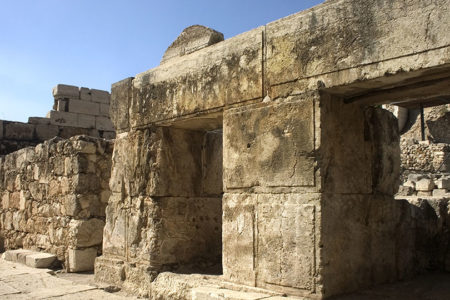Words of Warning Hebrews 10:26–39
This section of the book of Hebrews comes on the heels of a strong warning in 10:25 that believers not abandon assembling together, as some were doing. In fact, Christians in every generation are exhorted not to forsake meeting together.
With judgment approaching, the author provided the fourth of five warnings in Hebrews. This one is much severer than the previous three (cf. 2:1–5; 3:7—4:13; 6:4–8) and is directed to people planning to desert the local congregation and return to the ritualistic system of Judaism. Harsh though it is, it is balanced by a promise of hope and reward to all who remain faithful until Christ returns for His church.
Peril of Rejection
“For if we sin willfully after we have received the knowledge of the truth, there no longer remains a sacrifice for sins, but a certain fearful expectation of judgment, and fiery indignation which will devour the adversaries” (10:26–27). The word for connects this section with the previous part of chapter 10 and tells readers why they should heed the warning:
- Because they possessed full “knowledge of the truth” they received in Christ.
- Because they understood the sin they would be committing. If they proceeded, they would be doing so “will-fully,” giving forethought to their action and deliberately choosing to pursue sin, no matter what others might say.
- Because forsaking the church and returning to Judaism meant embracing a legalistic system that was replaced by the ministry of Christ’s heavenly priesthood. The Levitical system they had come out of operated under the Mosaic Law and “no longer [had] a sacrifice for sins” (v. 26). That is, the sacrifices offered under the Law were no longer effective in God’s sight because it is Christ’s sacrifice that removes sin.
- Because forsaking the church meant facing “a certain fearful expectation of judgment, and fiery indignation” (v. 27). Leaving the church to identify with the ritualistic Temple system brought God’s judgment on those who returned to a religious system outside of Christ. In this case they were reuniting with a people who would suffer physical judgment from the hand of God.
The author followed his statement with an example from the Mosaic Law: “Anyone who has rejected Moses’ law dies without mercy on the testimony of two or three witnesses. Of how much worse punishment, do you suppose, will he be thought worthy who has trampled the Son of God underfoot, counted the blood of the covenant by which he was sanctified a common thing, and insulted the Spirit of grace?” (vv. 28–29).
Under the Law, if a person refused to accept the authority of the Mosaic Law and showed his disdain by deliberately not obeying it, there was no sacrifice offered for, or mercy shown to, that individual. Such a person was convicted on the testimony of two or three witnesses. Once convicted, he was executed by stoning (Dt. 17:4–7).
Although the offense of deliberately rebelling against the Mosaic Law was serious in God’s eyes, the offense against Christ and the New Covenant was more serious and deserved greater punishment.
Why? Because this offense rejects the triune God by (1) trampling under-foot God the Father’s plan to provide salvation through Christ; (2) counting Christ’s blood a common thing; and (3) turning one’s back on the Holy Spirit who regenerated, sealed, filled, and baptized that very individual into the body of Christ. This is a great insult.
To count the blood of Christ, through which believers obtain salvation and positional sanctification, as being of less value than the blood of Old Testament sacrifices is a major offense. It is even a worse offense to reidentify with those who reject Jesus as the Messiah and Savior. Such action would align believers with people who completely reject the triune God’s plan for salvation.
Quoting from Deuteronomy 32:35–36, the author emphasized that it is God who will judge the apostates: “For we know Him who said, ‘Vengeance is Mine, I will repay,’ says the Lord. And again, ‘The Lᴏʀᴅ will judge His people’” (Heb. 10:30).
Here the author tells why God must judge:
- God cannot look on or overlook sin without taking action on the sinner.
- God’s character, righteousness, and holiness demand that He bring judgment on willful sin that is not confessed.
- “Vengeance” belongs only to God who is able to administer judgment rightly and appropriately to fit the rebellious deeds of man.
- Scripture clearly teaches that people cannot reject God and sin against Him without punishment.
- God’s judgment is well deserved on those who possess full knowledge of Christ’s perfect sacrifice, receive Him as Savior, and then reunite with those who deny Him.
If those being addressed thought they could simply return to Judaism after coming to Christ, they were gravely mistaken. Even in the Old Testament, people who turned away from God experienced His judgment and perished. Verse 31 states, “It is a fearful thing to fall into the hands of the living God.”
Falling into the hands of someone means being brought under that person’s authority and power. God is fully aware of the spiritual states of all men, especially the hearts and deeds of believers. God is perfect and righteous and will execute absolute justice on all people according to their deeds. “Shall not the Judge of all the earth do right?” (Gen. 18:25). Such sobering words should have awakened any believer and caused him or her not to return to Judaism.
Whether the author had in mind believers who turned back to Judaism after embracing Christianity or believers who only might do so is impossible to know. Most likely the passage warns true believers of the outcome, should they decide to forsake Christ.
Plea to Remember
Readers are alerted to remember a major persecution they suffered at their conversion: “Recall the former days in which, after you were illuminated [enlightened], you endured a great struggle with sufferings” (v. 32). The word illuminated refers to the light of the gospel clearly being perceived, understood, and appropriated, resulting in salvation. They are to “recall” continually the time when they endured severe civil and/or religious persecution when they boldly stood for Christ. Their steadfastness gave evidence of genuine salvation.
These believers suffered for their faith in two ways. First, they “were made a spectacle both by reproaches and tribulations” (v. 33). The word spectacle is our word for “theater” and means to be put on stage, as in an amphitheater, and held in derision or mocked and ridiculed with contempt.
Second, they suffered because they were “companions of those who were so treated” (v. 33). That is, they were companions of other Jewish believers, and this fact brought them persecution because of their identification with the church. These Jewish believers were being unjustly mocked by other Jewish people for their commitment to Christ.
The author says of these believers, “For you had compassion on me in my chains, and joyfully accepted the plundering of your goods, knowing that you have a better and an enduring possession for yourselves in heaven” (v. 34). They were companions with fellow believers who showed them “compassion” (deep feelings of sympathy) during their imprisonment. They “joyfully” accepted the unjust seizure of their possessions because they knew they had possessions in heaven that were theirs forever. These last two verses provide evidence of their true faith in Jesus Christ.
Promise of Reward
Verse 35 is a direct personal challenge: “Therefore do not cast away your confidence [boldness], which has great reward” (v. 35). The phrase cast away means to “fling” or “throw away.” The Scripture exhorts them not to throw away the boldness they once had in Christ, as one would throw away an old, worthless garment. In the past, these believers manifested a life of boldness that supported and sustained them during suffering and loss of their possessions. Now they are exhorted and encouraged to exercise the same boldness they had then to sustain themselves through the present crisis that was shaking their faithfulness. They must not throw away their boldness and faith in Christ so as not to lose their “reward” at the judgment seat of Christ.
These believers are told exactly what they need: “For you have need of endurance [patience], so that after you have done the will of God, you may receive the promise” (v. 36). They did not need more faith because, in the past, they had sufficient faith to stand against persecution. What they needed was to exercise their faith with patient endurance to obtain the promise. By doing the “will of God” they would “receive the promise,” or the reward, promised at the judgment seat of Christ.
In order to support his point, the author quoted Habakkuk 2:3–4: “For yet a little while, and He who is coming will come and will not tarry. Now the just shall live by faith; but if anyone draws back, My soul has no pleasure in him” (Heb. 10:37–38). Sometimes it seems as if the Lord tarries and delays the fulfillment of His promises, but such is not the case.
In Habakkuk’s day, it seemed as if God took no notice of Judah’s sin because it went unjudged. But God’s judgment was certain; He would use the Babylonians to punish Judah. God has an appointed time to execute His divine plan. In the meantime, “the just [righteous] shall live by faith” (v. 38; cf. Hab. 2:4). In other words, righteous people must live by faith in the midst of persecution and trust that God is faithful to fulfill what He has promised. One who “draws back” in disobedience and unbelief will experience the Lord’s displeasure.
The message concludes with an expression of confidence in the Jewish believers to whom the author was writing: “But we are not of those who draw back to perdition [destruction], but of those who believe to the saving of the soul” (v. 39). Because he identified with his readers, we know the author considered them believers in Christ. Those who drew back into Judaism were unsaved. He was confident those he addressed would not forsake the life of faith.
Where do you stand?








So very helpful in understanding Hebrews 10:26-39. I was feeling condemned and questioning my salvation and eternal destination. Thank you for your clear presentation of the meaning of these verses and why the author of Hebrews brought in the Old Testament verses for proving his point of the consequences of returning to Judaism.